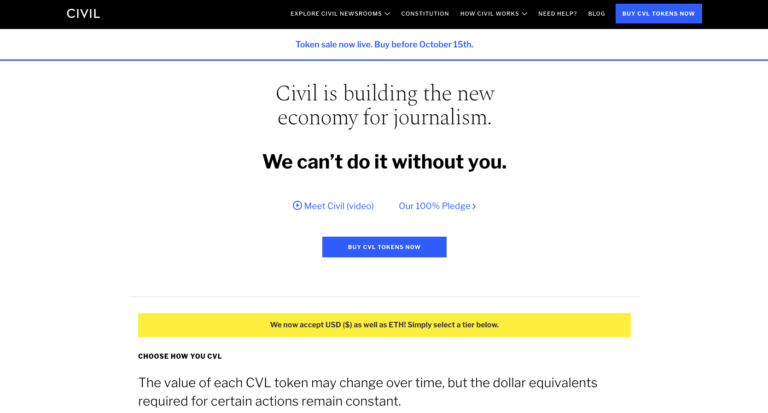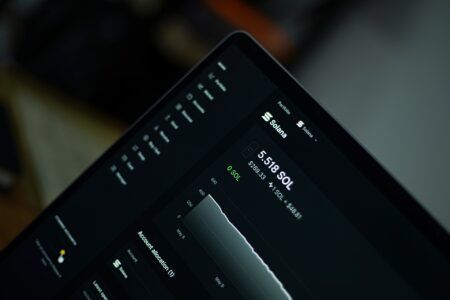On Tuesday (9 October), Forbes announced that it was partnering with the journalism-focused Ethereum-powered platform Civil to experiment with publishing content to the blockchain.
On the landing page of its website, Civil describes itself as “a diverse marketplace for local, international, investigative and policy journalism.” On the “about page”, it calls itself “the decentralized marketplace for sustainable journalism.” Both of these sound good, but to get a better understanding of Civil, we need to take a look at its white paper. Here, we learn that:
- Civil is a “decentralized communications protocol for journalists and citizens, launched by The Civil Media Company.”
- “The protocol limits the need for (and influence of) third parties like advertisers and centralized publisher conglomerates.”
- “Civil’s cryptoeconomic model seeks to enable a more direct, transparent relationship between journalists and citizens, while using blockchain to also strengthen protections for journalists against censorship and intellectual property violations.”
- “Activity on the Civil protocol will be mediated through the Ethereum blockchain and a community of consumers, content creators, fact checkers and publishers, who work together to decide which newsrooms to organize and the types of content published on the network.”
- “In order to achieve Civil’s decentralized goal, activity on the platform will be managed by an Ethereum blockchain-based token, CVL.”
- “Journalists, or “newsmakers” as they’re known on Civil, will own and operate independent publications (“Newsrooms”) while retaining full autonomy over all editorial and business decisions.”
- “Newsrooms primarily seek compensation directly from the citizens they serve and possess full control of their revenue model…”
- “… citizens will be able to choose to compensate newsmakers in any currency, including fiat using traditional credit card processors as well as cryptocurrency (even CVL!) via web wallets.”
- “To establish a high bar for quality content and discourse, all participants in the marketplace agree to abide by the Civil Constitution, a self-governed statement of purpose, values and code of conduct in keeping with our mission to power sustainable journalism throughout the world.”
- “The Ethereum blockchain plays a foundational role in Civil’s model: it enables the creation of a custom token, CVL, which is based on the ERC20 protocol.”
- “The Civil Registry is a self-governing, token-curated whitelist of newsrooms that have been approved to publish content on Civil’s platform. To access the Civil Registry, a prospective Newsroom must submit a journalistic mission, a newsroom roster, sign the Civil Constitution and stake CVL tokens to state the seriousness of their intent.”
Civil makes it possible for Forbes to gain a better understanding of blockchain technology and how publishing on the blockchain “can increase trust with audiences”. Also, it “allows Forbes to assess emerging opportunities that can potentially unlock new forms of audience engagement and drive additional revenue streams.”
Salah Zalatimo, Senior Vice President of Product & Technology at Forbes said:
“We are relentlessly focused on rapid experimentation and implementation so that we can determine what’s in the best interest of our audience and what is next for our industry. Forbes and Civil believe passionately in the mission of journalism, and together we can provide audiences with a level of unprecedented transparency around our content. We’ll also be able to expand the reach of our writers and identify new revenue channels over time.”
Matthew Iles, the CEO of The Civil Media Company had this to say:
“Civil’s mission is to power sustainable journalism throughout the world, and Forbes’ commitment to regularly publish content on our platform is a major milestone for our approach. We look forward to working with Forbes as we connect with a broader audience interested in new, more direct ways to discover, share and support ethical journalism.”
Under the agreement with Civil, Forbes will start publishing metadata from “select articles” (initially, this is expected to be crypto-related content) to the Ethereum blockchain via Civil in Q1 2019. If things go well, Forbes may decide to publish metadata for all of its articles at some later date in 2019. The press release says that publishing such metadata “will indelibly establish the author’s identity and credibility, as well as the expert nature of participating sources”.
An article that has had its metadata published to the blockchain will have a Civil “badge” next to it on Forbes.com to indicate “that the content has been inscribed into the blockchain and is published in accordance with Civil’s journalistic values, as detailed in the Civil Constitution.” Another benefit is that the “act of publishing Forbes metadata on Civil also serves as the starting point for potential licensing and syndication technologies in the future.”
Axios, which got the scoop on this story, explains why this partnership is important:
“Many publishers are skeptical of introducing blockchain technology into their supply chains, because it’s new and it’s difficult to understand. Forbes is sending a message to the industry that they think blockchain for journalism is the future.”
According to Axios, Forbes has its own content management system (CMS) called “Bertie.” This will need to get integrated with Civil’s software.
On 28 August 2018, Techcrunch reported that Civil, the blockchain startup “that wants to save the journalism industry by leveraging the blockchain and cryptoeconomics” had partnered with the 172-year-old Associated Press “to help the wire service stop bad actors from stealing its content.”
The Civil CEO told Techcrunch:
“We have a problem now of not even just dealing with literal fake news, but dealing with the social aspects of people not really knowing what to trust anymore because people are throwing around allegations. We think [Civil] is going to create far better signals for consumers to really know if a news organization is trusting and credible, despite whatever powerful people might be saying.”
Featured Image Courtesy of The Civil Media Company









